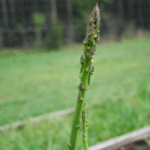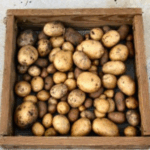I’m on a quest this year to outwit the insects in my garden. Between the Colorado potato beetles that threaten to eat everything to the grasshoppers, squash bugs, stink bugs, white flies and God only knows what else, I’m left to wonder why anyone gardens at all. Outwitting the insects is my mission this year, and I think I’ve found a way to get there….
Outwitting Insects by Changing Planting Times
Sometimes, outwitting insects means changing the expected environment they love. I’m talking about planting things slightly outside of the usual sequence to keep insects from finding the food or nesting places they love.
This is my theory: insects need specific plants for food, shelter and breeding or nesting sites. Their life cycles are governed by these needs. If I withhold what’s needed from them, and plant it at times when they’re least expecting it…maybe, just maybe, I can squeak out a crop without them noticing it.
That’s my theory, at any rate.
Organic Gardening Methods to Control Insects
Here’s what I’ve done this weekend:
- I removed all of the weeds from the potato bed and pulled up the little potatoes that were left. The Colorado potato beetles pretty much decimated the leaves, but the roots had a little time to develop. The roots are where you find nice potatoes. I harvested a bowl full and we enjoyed fresh Yukon gold potatoes yesterday, and I have enough for a few more meals, so I’m satisfied.
- The remaining Colorado potato beetles will seek similar nightshade family plants. That means tomatoes. I am finding a few on the tomato plant leaves, but not nearly as many as were on the potatoes. These I pick off by hand and dunk into an empty detergent bottle with a little soapy water at the bottom.
- For other beetles, like squash bugs, who enjoy infecting my squash, zucchini and cucumbers with microbes that spread fungal wilts and bacteria diseases, I waited until this weekend, July 10th, to plant the seeds. It’s very late in the season; typically, I’d plant these by mid-May. But my guess is that the insects who love them may have moved on to other places seeking food. At least I hope so. In the meantime, I do have empty spaces where I pulled up the bolted lettuce. I had the seeds, so what’s to lose? Nothing except a few seeds. Since I already have a mouse eating through the seeds in my basement I may as well plant the seeds!
What’s the “Right” Way to Control Plant Diseases and Pests?
Many times, I speak with people and they just want to know the “right” thing to do. Sometimes there really isn’t a right thing to do. Sure, you can use pesticides to kill those “bad” bugs. But when you use the pesticides, you may accidentally kill some “good” bugs too. You can use barriers like floating row covers. You can use trap crops, or plants that you sacrifice to keep others alive, the way I let the potato beetles enjoy the potatoes to save my tomatoes. There are plenty of organic gardening methods you can use.
But it’s not always a cut-and-dried answer to your gardening questions. Sometimes, you just have to take your best guess and try a solution that does the least harm to the garden. Who knows if it will work? When the rewards of the garden outweigh the bother of planting a few seeds a little later in the year, it’s well worth the trouble.




